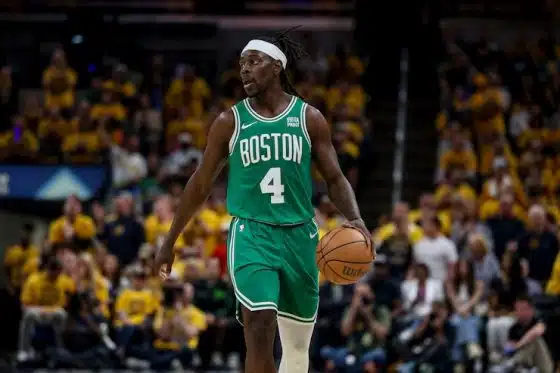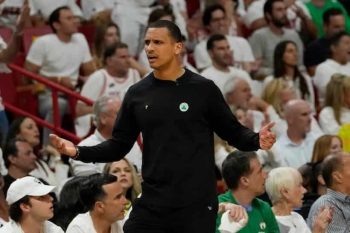NBA
Jrue Holiday Is Showing Exactly Why The Celtics Traded For Him

Key Highlights
- Jrue Holiday averaged 18.5 points, 7.0 rebounds, 5.8 assists (2.3 turnovers) and 1.2 steals per game during the Eastern Conference Finals
- He shot 77.2 percent on two-pointers, 41.7 percent from deep, and 100 percent at the line (73.4 percent true shooting)
- His 74 points in the series marked his most across any four-game stretch this season
When the Boston Celtics acquired Kristaps Porzingis last summer, it was an acknowledgement that they must address a few crucial areas if they wished to be the juggernaut they’ve become this season. While their offense was very good, it was somewhat rigid, lacking any sort of interior foundation through which to diversify possessions as a hub or finisher. And while Al Horford and Robert Williams III were both vital contributors, neither felt ideal, at that point, to be the starting center (Horford for the decline his age has brought; Williams for the constant string of injuries).
Porzingis’ arrival checked off both boxes, giving Boston a 20-point scorer who spaced the floor, posted mismatches, finished at the rim, and patrolled the paint as a defensive anchor. He merged many of Horford and Williams’ invaluable qualities into one player, and provided significantly more scoring upside.
But landing the Latvian required moving Marcus Smart, whose playmaking pop and defensive verve were integral to the Celtics’ excellence over the past half-decade. Derrick White assumed some of the ball-handling shares Smart left behind and remains a dogged defender. Yet that meant somebody had to replace White’s old role in the starting unit as a malleable, premier stopper with the scoring and shooting chops.
While all good players in their respective ways, none of the in-house candidates — Horford, Williams or Malcolm Brogdon — fit that mold. So, three months later, amid the aftermath of Damian Lillard‘s migration to the Milwaukee Bucks, Boston snagged Jrue Holiday from the rebuilding Portland Trail Blazers, sending out Brogdon and Williams in the process.
Although broadly similar — defensive-minded combo guards qualified to control the offense in a pinch — Smart and Holiday are not identical twins. Smart is a superior facilitator who’s sharper in help situations defensively, especially on the interior. Holiday is better face-guarding off the ball and instills more as a shooter and individual creator.
During the Eastern Conference Finals against the Indiana Pacers, Holiday’s scoring credentials were fully evident. Had the Celtics not traded for him, they would’ve remained very good. But they likely would not already be in the NBA Finals, nor would they have been as equipped to handle Porzingis’ lengthy absence. Holiday sliding into that fifth starter spot has been integral to their dominance. He showcased exactly why during their tense sweep over the Pacers.
In four games, the sage veteran averaged 18.5 points, 7.0 rebounds, 5.8 assists (2.3 turnovers), and 1.2 steals. His 74 points were his most across any four-game stretch this season. He shot 77.2 percent on two-pointers, 41.7 percent from deep, and 100 percent at the line (73.4 percent true shooting). He was 12-of-13 at the rim, 5-of-9 on two-pointers outside the restricted area, 10-of-24 beyond the arc, and 10-of-10 at the charity stripe — highly efficient everywhere on the floor.
To open the series, Indiana stashed its All-NBA point guard, Tyrese Haliburton, on Holiday. There’s not really a viable place to hide any poor defender against Boston’s multifaceted mauling. The Celtics had no qualms about involving Holiday more often with the ill-equipped Haliburton guarding him. Before the star initiator departed Game 2 early because of a hamstring flare-up, which sidelined him for Game 3 and 4 as well, Holiday punished him numerous times.
He’s a savvy off-ball mover, adept outside shooter and bruising strength-based creator, particularly against mismatches. Whereas Smart often posts up to unlock passing windows, Holiday is looking to fill his own scoring column in these scenarios. Just like his fellow starters, Holiday is also a smart screener, cognizant of when to enforce contact and when to slip into space. All of these attributes exacerbated Haliburton’s struggles.
Even when Haliburton wasn’t his target, he flourished. He rocked in early offense — a trademark of his and Jaylen Brown‘s games — wiggled his way downhill and chiseled inside for buckets.
The 33-year-old is among the league’s brawniest guards. He prods defenses with his torso like a boxer tossing out body blows. Once he’s carved the requisite space or exhausted his defender to the moment of seeking a brief reprieve, he touts economical footwork to find his spots. Boston didn’t rely on him to be a consistent creator last round, but he had little issue moonlight as a vaunted scorer.
The dribble handoff keeper above (third clip) is my favorite of the bunch. The White-Holiday DHO has delighted this postseason and Indiana overplayed it, so Holiday called an audible and swiveled to the rim for an unencumbered layup.
When the offense centered elsewhere — on the likes of Brown, White and Jayson Tatum — Holiday was comfortable stamping his mark efficiently. It’s the connective tissue role he played much of the season, spacing the floor, roaming off the ball and drifting to the dunker spot, offering a different look than Boston’s traditional five-out principles.
Whereas Milwaukee’s offensive environment demanded Holiday play on the ball most frequently (not always within its control because of injuries), Boston allows that to be a background feature of his game. He can crush mismatches as a fourth or fifth option, but is entirely able to be a souped-up 3-and-D starter when the situation warrants.
After opening the year a bit slowly offensively, he’s settled in aptly. His blend of on- and off-ball scoring against the Pacers exemplifies that assimilation.
Facing the league’s No. 2 offense — a group that posed problems for lengthy portions even without Haliburton — Boston needed Holiday’s offense spunk. Porzingis’ absence was two-pronged. It compromised the Celtics offensively and left them more susceptible to the potency of Indiana’s drive-drive-drive brigade.
Holiday’s capacity to dial up the aggression in varying ways helped them maintain their top-ranked offense and continue fielding two All-Defensive guards together. Boston and Holiday’s defense had pronounced lulls, but honed in during the second half of Game 3 and 4 to solidify comebacks, all while continuing to light up the scoreboard. That duality doesn’t exist with Williams or Brogdon in his stead.
Holiday was overqualified for his gig much of the season. That’s partly why Boston cruised to 64 wins; it’s an incredible luxury to slot a player of his caliber in that spot. But with Porzingis injured, he shifted up the hierarchy and tapped into his All-Star form. His presence evolved from a luxury into more of a charmed, welcomed existence.
It’s the sort of reality Boston gave itself wiggle room to enjoy when adding Holiday eight months ago. An elite roster could weather a hit and nonetheless thrive. Its high-end talent taking on more specialized tasks would instead see broader, still-well-fitting responsibilities. Holiday embodies that dynamic best and it proved instrumental as the Celtics swiftly nabbed their second Finals berth in three years.














